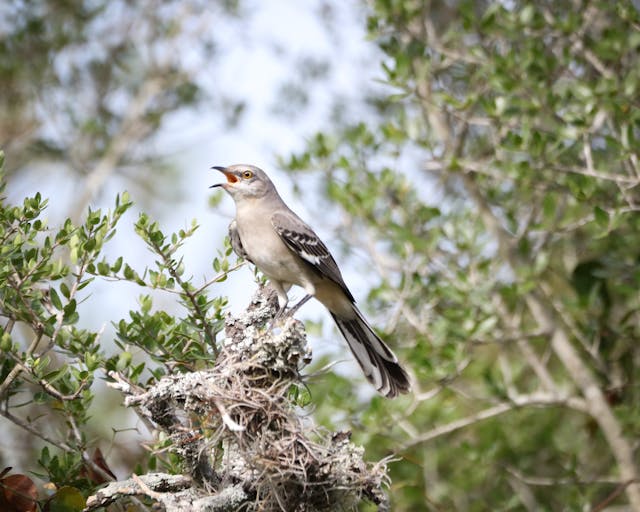
Why do birds sing at dawn? Birds seem to sing at dawn to mark their territory and to attract mates. Birds also sing at dusk, but the majority of singing is at dawn. This is called the “Dawn Chorus” and it is more common in the spring, breeding season, than at other times of the year.
Birds, just like us, have circadian rhythms that are controlled by the amount of daylight. Sunlight affects their hormones, which makes them more active around sunrise. They are also evolutionarily programmed to start to sing as their circadian rhythms wake them up in the morning. The artificial lights in cities are the reason why some birds are active even earlier.
You might not notice this so much if you live in a heavily built-up urban environment, but the dawn chorus can be extremely loud. It can sometimes be so loud that people cannot sleep through it. Many urban areas do still have birds, of course, but they tend to be birds like crows and pigeons. Birds that have learned to live off humans and our waste. These birds do also sing, or rather caw, in the morning. And, if you live on a farm, cockerels are also famous for crowing in the morning. So, is this true, and why would it happen?
Firstly, not all birds do this. Studies on birds in a rainforest found that the birds that sing in the morning tend to be highly territorial. Birds that are less territorial tend to sing less or just use their calls as warnings of danger or to attract a mate. Female birds also sing in the morning, but the majority of the birds we can hear are male.
The first reason they sing is to mark their territory. This works in two ways. Different species have evolved different songs, and any bird that hears another bird singing can tell whether it is the same species or not. Also, birds within the same species have slightly different songs, and a bird will know from the type of song and the strength of the song how large and how powerful that bird is. The sound will carry far enough to warn birds away from that territory.
The second reason is to attract a mate. For the same reason as territorial warnings, the strength of a bird’s song is an indicator of how strong and healthy it is. The healthier a bird, the louder it can sing. Female birds will be attracted to the loudest song because that is a sign that their offspring will be healthier.
The reason birds sing at dawn is not well known, but it is thought to be because sound travels further through the air at that time of day. As the sun is just coming up, the air is cooler, which makes it denser. Sound waves travel much further and more clearly through denser objects. The humidity is slightly higher as well, which means the sound doesn’t degrade as quickly, and cooler air with higher humidity brings less wind, which reduces the distortion of the birds’ cries. It is also likely that dawn is the hardest time for predators to find them. A singing bird needs to find a mate, but they also need to avoid being eaten by predators. At night, it is too hard for the birds to see, and in the daytime, it is too easy for predators to find them. The dawn might be the best of both worlds.
Some birds do cry throughout the day. Crows are one of them. They do caw a lot at dawn, but they also caw all day long. They are very social animals, and they do something that is unusual among birds. They caw to alert other birds when they find food. Most birds keep silent when they find food because they want it all to themselves. Crows like to have allies to help them get at food, because this cooperation can result in all of the birds getting more food. Crows also don’t have many predators, so they don’t need to worry about being seen. We may also think a crow’s caw is louder than it actually is because it is amplified by the buildings in the cities they live in. Crows may also caw earlier than the dawn because of the impact of modern lighting on their circadian rhythms.
Roosters are also famous for crowing at dawn. Many farmers have used cockerels as an alarm clock for millennia. Roosters also crow to mark their territory and to attract a mate, but they also crow to gather their flock together and get their hens to become active. A flock of chickens usually only has one rooster, who controls them. The rooster is in charge of protecting the flock, and crowing is a way of reassuring the hens, showing their dominance, and of warning any would-be predators. However, just like crows, roosters continue to crow all through the day. And this is what I learned today.
Sources
https://www.nationalgeographic.com/animals/article/birds-dawn-chorus
https://en.wikipedia.org/wiki/Dawn_chorus_(birds)
https://www.npr.org/2025/06/20/nx-s1-5436078/why-birds-sing-dawn-chorus-research-study
https://www.almanac.com/why-do-roosters-crow-10-riveting-facts-about-roosters
https://en.wikipedia.org/wiki/Bird_vocalization
Photo by Janice Carriger: https://www.pexels.com/photo/singing-northern-mockingbird-in-lush-greenery-34230958/
